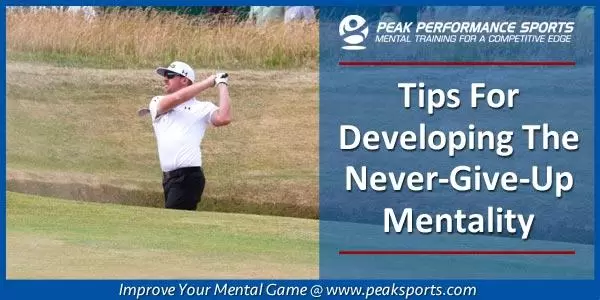
Persistence In Golf
The recipe for long-term success in golf is a mixture of patience, persistence and perseverance.
Persistence is that quality that allows golfers to persevere, push forward and work towards your goals despite obstacles.
Persistence requires delayed gratification. Golfers have to make a large down payment of work and effort to achieve success.
Many golfers in today’s world instead want instant gratification (“I want it now”) without putting the required amount of work to achieve success. These impatient golfers tend to give up when they don’t see immediate results.
Have you ever worked on your putting or tee shots for months and didn’t seem to reap the benefit of your hard work?
You probably felt those hours and hours of practice seemed like a waste of time… You may have wanted to quit playing golf.
Persistence and perseverance in the face of obstacles are prerequisites for high-level achievement in golf.
Persistence and perseverance are grounded in the belief that success will come if you keep working to improve your game.
Persistence and perseverance are the mental skills that help you view bad shots and bad tournaments as means to improve your game and not as an indictment against your ability.
J.L. Lewis, winner of two PGA events (The John Deer Classic and 84 Lumbar Classic) was interviewed by me about the importance of the mental game and persistence and perseverance in golf.
J.L. Lewis is a veteran PGA Tour golfer and a great example of persistence and perseverance for golfers at every level.
How has persistence benefited Lewis? Well, Lewis turned professional in 1984 but did not see the fruits of his labor until he won his first tournament 15 years after joining the Tour.
COHN: “How many people would have stuck it out until their late 30s just grinding it out saying I’m going to do this?”
LEWIS: “I just never give up… I’m the type of person, if you beat me, it doesn’t bother me. We just keep playing until I get better. That’s kind of my mentality. If you quit, how are you going to get better? I just keep going.”
“I don’t look at as winning or losing. If I’m playing at a tournament and I play really well and get third place, I don’t walk away from the tournament and feel I failed. I walk away thinking I accomplished what I wanted to accomplish. I wanted to play well and I did play well. There were some circumstances I could have done better, a few shots here or there but if you finish that high, there were a lot of things that obviously went right and so I always try to focus on that and try to build on that.”
“If you are coming down the stretch in a tournament and you have a chance to place high, I don’t think about that. I think about this shot. What’s the best I can do on this shot? Execute, execute, execute… It’s all about making yourself better and not putting so much emphasis on winning and losing.”
Tips for developing the never-give-up mentality:
- Tip #1: Use each tournament as an experience to improve your game. It took you years to develop your game and the process is never finished. Be patient and continue the process of improving.
- Tip #2: You should evaluate your performance honestly so you can improve your weaker areas. What did I do well? What needs to improve? How could I have played that shot differently? What will I do to improve that shot for the future?
Successful golfers have learned how to perform with ultimate confidence in competition. We’ve developed The Golfer’s Mental Edge Workbook Program to help you do this.
Related Sports Psychology Articles
- Play Golf Beyond Your Comfort Zone
- Execute Your Range Swing to the Golf Course
- Starting Your Golf Round with a Calm Mindset
*Subscribe to The Sports Psychology Podcast on iTunes
*Subscribe to The Sports Psychology Podcast on Spotify
Download a free sports psychology report to improve your mental game!
Learn more about our one-on-one mental game coaching.
Golfer’s Mental Edge

What’s the big sign that your mental game is the weak link in your golf game? When you can’t play consistently as well as when you play a practice or casual round–or your range game is way better than your game on the course. If you suffer from lack of focus, low self-confidence, poor composure or other mental game obstacles on the course, you can’t reach your true potential in golf.
The Golfer’s Mental Edge 2.0 Audio and Workbook program is ideal for any amateur, collegiate, junior, and tour professional golfer.
Golf coaches and instructors would also be wise to teach “The Golfer’s Mental Edge 2.0” principles to their players. This program is perfect for any golfer who wants to improve performance and consistency by managing their mind better on the course.
